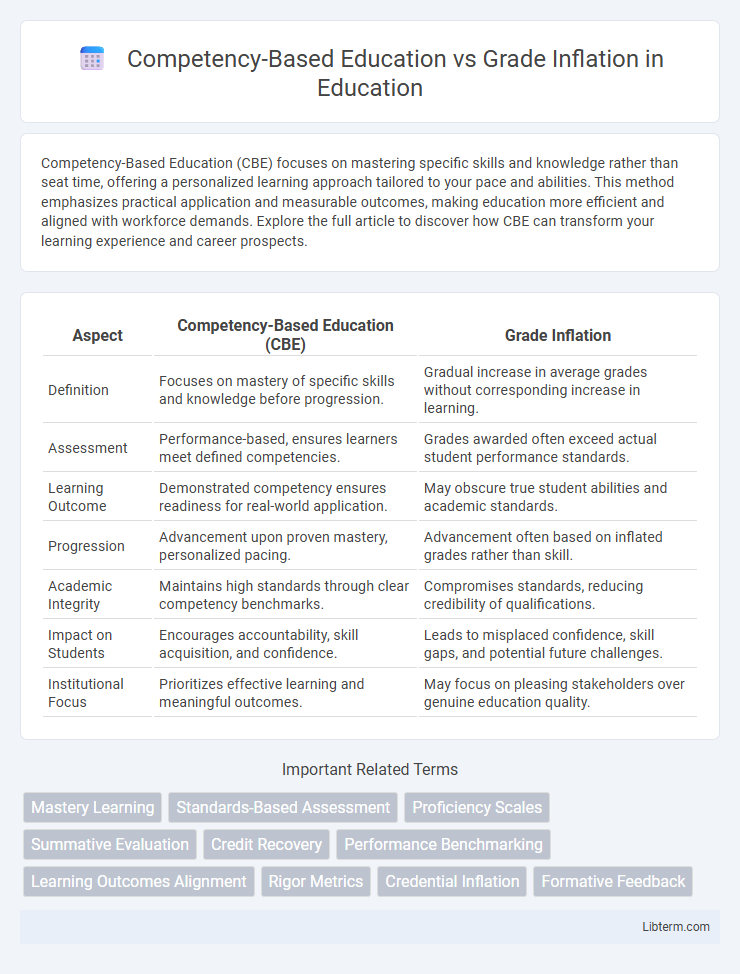Competency-Based Education (CBE) focuses on mastering specific skills and knowledge rather than seat time, offering a personalized learning approach tailored to your pace and abilities. This method emphasizes practical application and measurable outcomes, making education more efficient and aligned with workforce demands. Explore the full article to discover how CBE can transform your learning experience and career prospects.
Table of Comparison
| Aspect | Competency-Based Education (CBE) | Grade Inflation |
|---|---|---|
| Definition | Focuses on mastery of specific skills and knowledge before progression. | Gradual increase in average grades without corresponding increase in learning. |
| Assessment | Performance-based, ensures learners meet defined competencies. | Grades awarded often exceed actual student performance standards. |
| Learning Outcome | Demonstrated competency ensures readiness for real-world application. | May obscure true student abilities and academic standards. |
| Progression | Advancement upon proven mastery, personalized pacing. | Advancement often based on inflated grades rather than skill. |
| Academic Integrity | Maintains high standards through clear competency benchmarks. | Compromises standards, reducing credibility of qualifications. |
| Impact on Students | Encourages accountability, skill acquisition, and confidence. | Leads to misplaced confidence, skill gaps, and potential future challenges. |
| Institutional Focus | Prioritizes effective learning and meaningful outcomes. | May focus on pleasing stakeholders over genuine education quality. |
Understanding Competency-Based Education
Competency-Based Education (CBE) emphasizes mastery of specific skills and knowledge rather than time spent in class, allowing students to progress at their own pace. This approach shifts the focus from traditional letter grades to demonstrated competencies, reducing the risk of grade inflation by ensuring that grades reflect actual learning outcomes. By aligning assessment with real-world skills, CBE provides a more accurate measure of student ability and preparedness for professional challenges.
Defining Grade Inflation in Modern Academia
Grade inflation in modern academia refers to the progressive increase in average grades awarded to students without a corresponding rise in learning or achievement standards. This trend complicates the effectiveness of Competency-Based Education (CBE), which prioritizes mastery of skills and knowledge over traditional grade metrics. By emphasizing demonstrable competencies rather than inflated grades, CBE aims to provide a more accurate assessment of student abilities and readiness.
Key Differences Between Competency-Based Education and Traditional Grading
Competency-Based Education (CBE) emphasizes mastery of specific skills and knowledge measured through demonstrated performance, rather than accumulating points or letter grades. Traditional grading typically aggregates scores from tests, assignments, and participation, often leading to grade inflation as standards vary across educators and institutions. In contrast, CBE minimizes grade inflation by ensuring students progress only after proving competency, creating a transparent link between learning outcomes and assessment.
How Grade Inflation Impacts Student Learning Outcomes
Grade inflation distorts the true measurement of student learning outcomes by artificially boosting grades without corresponding mastery of competencies, leading to a gap between earned grades and actual skills. This undermines the effectiveness of competency-based education, which relies on accurate assessments to ensure students meet specific learning standards. As a result, students may progress without fully acquiring critical knowledge, weakening overall academic integrity and future readiness.
Advantages of Competency-Based Assessment
Competency-Based Assessment offers precise measurement of student skills by focusing on mastery rather than time spent in class, which reduces the risk of grade inflation common in traditional grading systems. It promotes personalized learning pathways, allowing students to progress at their own pace while ensuring they meet rigorous standards. This approach enhances transparency and accountability by providing clear evidence of competencies, aligning educational outcomes more closely with workforce requirements.
Challenges Presented by Grade Inflation
Grade inflation undermines the integrity of competency-based education by obscuring true student mastery, making it difficult to assess actual skills and knowledge. It creates challenges in maintaining consistent standards, as inflated grades diminish the incentivization for learners to achieve proficiency. Consequently, educators and institutions face hurdles in accurately differentiating student performance and ensuring accountability in competency assessments.
Comparing Academic Accountability in Both Systems
Competency-Based Education (CBE) emphasizes mastery of specific skills and knowledge, allowing students to progress upon demonstrating proficiency, which promotes transparent academic accountability through clear learning outcomes. Grade inflation in traditional educational systems undermines academic accountability by inflating grades without corresponding increases in student learning, masking true competence and creating discrepancies in academic achievement. Comparing both, CBE provides a more reliable measure of student performance by linking assessment directly to demonstrated competencies, contrasting with grade inflation that distorts performance indicators and weakens educational standards.
Effects on College Admissions and Employability
Competency-based education emphasizes mastery of skills and knowledge, providing a more accurate reflection of student abilities compared to traditional grading systems prone to grade inflation. Grade inflation in conventional education often leads to inflated GPAs, making it difficult for college admissions committees to differentiate between truly qualified candidates. Employers increasingly favor graduates from competency-based programs due to their demonstrated skills and practical competencies, enhancing employability and workforce readiness.
Solutions to Address Grade Inflation in Education
Implementing competency-based education (CBE) offers a clear solution to grade inflation by emphasizing mastery of skills and knowledge over traditional letter grades. Standardizing assessment criteria and utilizing performance-based evaluations reduce subjective grading and ensure consistent academic standards. Integrating frequent formative assessments and transparent grading rubrics enhances accountability and curbs inflationary grading practices in educational institutions.
The Future of Assessment: Moving Toward Competency-Based Models
Competency-based education prioritizes mastery of skills and knowledge over traditional letter grades, addressing the limitations of grade inflation by providing a more accurate measure of student learning and abilities. The future of assessment emphasizes personalized evaluations that track specific competencies, enabling clearer evidence of student progress and readiness for real-world challenges. This shift fosters transparency, accountability, and equity in education systems, preparing learners for dynamic career landscapes.
Competency-Based Education Infographic

 libterm.com
libterm.com